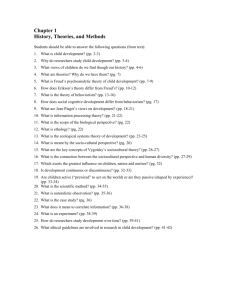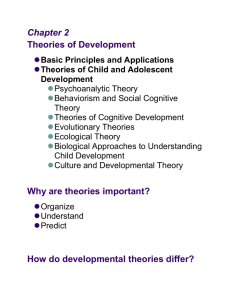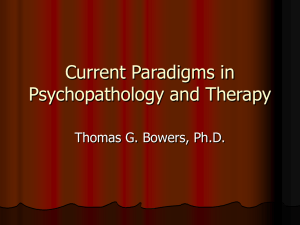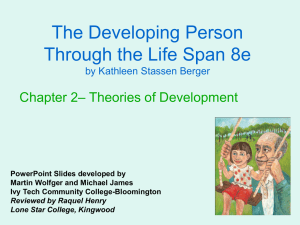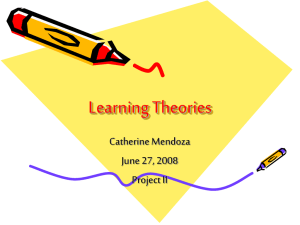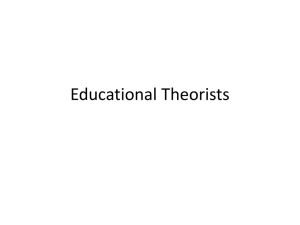The Developing Person Through the Life Span 8e
advertisement
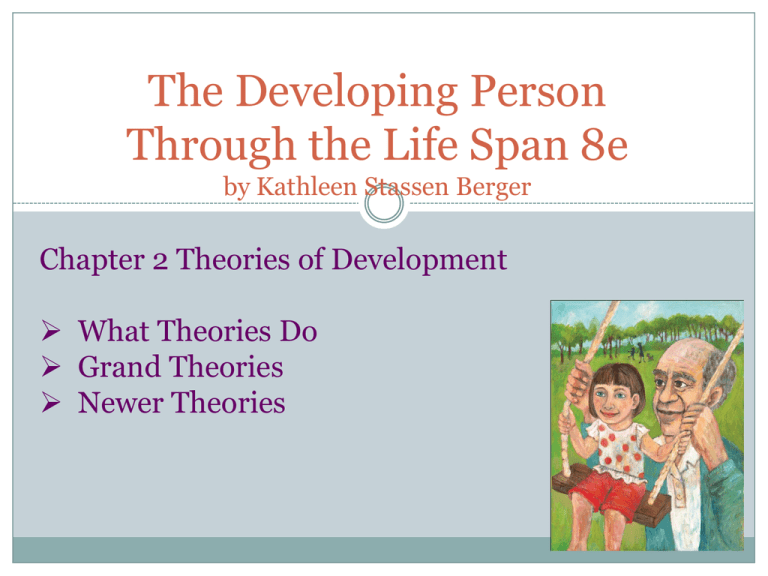
The Developing Person Through the Life Span 8e by Kathleen Stassen Berger Chapter 2 Theories of Development What Theories Do Grand Theories Newer Theories Developmental Theory Developmental Theory a group of ideas, assumptions, generalizations that interpret and illuminate the thousands of observations made about human growth provides a framework for understanding how and why people change as they grow older. What Theories Do Theories produce a hypothesis. Theories generate discoveries. Theories offer practical guidance. … Theories are NOT facts. Grand Theories Grand Theories of the Early 20th Century: Psychoanalytic Theory Behavioral Theory Cognitive Theory Newer Theories: Sociocultural Theory Universal Perspective: Humanism and Evolutionary Theory Psychoanalytic Theory A theory of human development that holds that irrational, unconscious drives and motives, often originating in childhood, underlie human behavior. Psychoanalytic theory originated with Sigmund Freud (1856– 1939) Psychoanalytic Theory Freud’s Psychosexual Stages of Development App. Age Stage 0-18 months ORAL STAGE: lips, tongue, gums are focus of pleasurable sensations 18ms. -3 years ANAL STAGE: Anus is the focus of pleasurable sensations, toilet training most important 3-6 years PHALLIC STAGE: Phallus (penis) most important. Boys proud/Girls wonder what’s wrong 6-11 years LATENCY: not really stage. Period during which sexual needs quiet Adolescence GENITAL STAGE: Genitals are the focus, young person seeks sexual satisfaction Adulthood Genital stage last throughout adulthood Psychoanalytic Theory Erik Erikson (1902–1994) Described eight developmental stages, each characterized by a challenging developmental crisis. His first five stages build on Freud’s theory; but he also described three adult stages. Psychoanalytic Theory Erikson’s Stages of Psychosocial Development App. Age Conflict Infancy 0-1 year Basic Trust vs. Mistrust Early Childhood 1-3 years Autonomy vs. Shame Preschool 3-6 years Initiative vs. Guilt School Age 6-12 years Industry vs. Inferiority Adolescence 12-19 years Identity vs. Confusion Young Adulthood 20-25 years Intimacy vs. Isolation Middle Adulthood 26-64 years Generativity vs. Stagnation Maturity 65-death Integrity vs. Despair Behaviorism A theory of human development that studies observable behavior. Also called “learning theory” as it describes the laws and processes by which behavior is learned. Conditioning - the processes by which responses become linked to particular stimuli and learning takes place. • Classical Conditioning • Operant Conditioning • Social Learning Behaviorism Classical conditioning Ivan Pavlov (1849-1936) (also called respondent conditioning), a process in which a person or animal learns to associate a neutral stimulus with a meaningful stimulus, gradually reacting to the neutral stimulus with the same response as to the meaningful one. https://www.youtube.com/watch?v=HZPXVb0W3Hc Behaviorism Operant Conditioning Behaviorism Operant conditioning B.F. Skinner (1904–1990) (also called instrumental conditioning) a learning process in which a particular action is followed either by something desired or by something unwanted. https://www.youtube.com/watch?v=y-g2OmRXb0g https://www.youtube.com/watch?v=AK32448CgK E Behaviorism Social Learning Theory- Albert Bandura An extension of behaviorism that emphasizes the influence that other people have over a person’s behavior. Modeling- people learn by observing other people and then copying them. Self-Efficacy- how effective people think they are when it comes to changing themselves or altering their social context. http://www.youtube.com/watch?v=YclZBhn40hU Cognitive Theory Jean Piaget (1896–1980) Thoughts and expectations profoundly affect action. Focuses on changes in how people think over time. Cognitive development occurs over four age-related periods Constructivist Perspective of Learning Cognitive Theory http://www.youtube.com/watch?v=TRF27F2bn-A Cognitive Theory Cognitive Equilibrium A state of mental balance, no confusion Interpret new ideas through past ideas Easy equilibrium not always possible If new experience is not understandable, cognitive disequilibrium can occur Assimilation Accommodation Cognitive Theory Information Processing Not a single theory but a framework Inspired by how a computer works How people think before they respond How attention and thought affects mental function Relationship between one person’s thinking and another’s Newer Theories Sociocultural Theory Leo Vygotsky (1896-1934) Development results from a person’s interaction with their social and cultural surroundings Culture is integral to development Apprenticeship in thinking: how cognition is “taught” by the older and more skilled Sociocultural Theory Zone of proximal development Made up of the skills, knowledge, and concepts that the learner is close to acquiring Learner needs help to master Learning must be individualized The Universal Perspective Humanism Abraham Maslow (1908- 1970), Hierarchy of Needs Carl Rogers (1902-1987) Stresses the potential of humans for good All people have the same needs Emphasize what people have in common The Universal Perspective Evolutionary Theory Based on Darwin’s ideas Humans are more alike than different Human development influenced by drives to survive and reproduce Selective adaptation: process by which people adapt to their environment Eclectic Perspective Eclectic perspective The approach taken by most developmentalists Aspects of each of the various theories of development are applied rather than adhering exclusively to one
